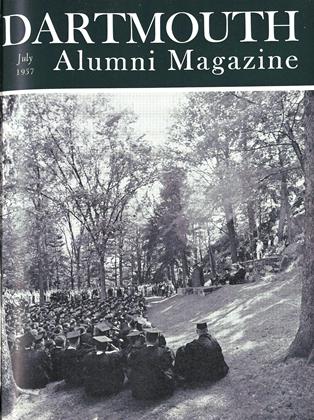1830. By William N. Fenlon'30. Chapel Hill: The University of NorthCarolina Press. 138 pp. $3.00.
This study had its origin in a paper that William N. Fenton '30 prepared for a conference on Early Indian and White Relations held under the auspices of the Institute of Early American History and Culture at Williamsburg. This particular conference was one of a series sponsored by the Institute, the others focusing to date on the topics of early American science, law and architecture. All of these conferences have had a similar mission, namely to encourage the broadening of historical studies into fields where relatively little research has been carried 011, and to provide future students with at least a starting point for such research.
Certainly no student of the American Indian is better fitted than Fenton for the task of bringing the two disciplines of anthropology and history to bear on the problem of Indian-White relations. Ever since he was an undergraduate he has made the Iroquois his particular study until today he is recognized as the outstanding authority on these people. In the course of his ethnological work he has used all manner of historical materials, and within the field of anthropology he has spearheaded the movement now known as ethnohistory.
The present essay is the rich result of nearly thirty years divided between the library and the field. In addition, the study is supplemented by an annotated bibliography which runs to nearly 90 pages, the joint work of Fenton, Lyman H. Butterfield, and Wilcomb E. Washburn '48. This comprehensive bibliography should prove most helpful to all students of the subject, divided as it is into seven main divisions: Reference and Bibliographical Aids; Ethnological Literature; Historical Literature; Serials; Manuscript Sources; Documentary Publications; and Special Topics (including captivities, portraiture, etc.). Herein reference is made to the resources of Baker Library, so all in all the book has a very strong Dartmouth flavor indeed!
 View Full Issue
View Full Issue
More From This Issue
-
 Feature
FeatureHopkins Center and Dartmouth Hall
July 1957 By CHURCHILL P. LATHROP -
 Feature
FeatureThe Commencement Address
July 1957 By DOUGLAS HORTON, D.D. '57 -
 Feature
FeatureThe Fifty-Year Address
July 1957 By JAMES M. O'NEILL '07 -
 Feature
FeatureThe Seniors' Valedictory
July 1957 By LLOYD L. WEINREB '57 -
 Feature
FeatureThe Honorary Degree Citations
July 1957 -
 Feature
FeatureThe 1957 Commencement
July 1957 By GEORGE O'CONNELL
ROBERT A. MCKENNAN '25
-
 Books
BooksTHE IROQUOIS EAGLE DANCE AN OFFSHOOT OF THE CALUMET DANCE.
February 1954 By ROBERT A. McKENNAN '25 -
 Books
BooksTHE SIOUX, Life and Customs of a Warrior Society.
JULY 1964 By ROBERT A. McKENNAN '25 -
 Books
BooksTHE INDIAN AND THE WHITE MAN.
NOVEMBER 1964 By ROBERT A. McKENNAN '25 -
 Books
BooksPARKER ON THE IROQUOIS. IROQUOIS USES OF MAIZE AND OTHER FOOD PLANTS. THE CODE OF HANDSOME LAKE, THE SENECA PROPHET. THE CONSTITUTION OF THE FIVE NATIONS.
JULY 1969 By ROBERT A. McKENNAN '25
Books
-
 Books
BooksTABARD
October 1951 By Kenneth A. Robinson -
 Books
BooksJ. RAMSAY MACDONALD
January, 1930 By L. H. Evans -
 Books
BooksWords of Wisdom
MAY 1984 By Peter Smith -
 Books
BooksFACULTY PUBLICATIONS
March, 1923 By WILBUR M. URBAN -
 Books
BooksAMERICANS AND CHINESE COMMUNISTS, 1927-1945: A PERSUADING ENCOUNTER.
NOVEMBER 1971 By WILLARD PETERSON -
 Books
BooksTHE MONETARY AND BANKING SYSTEM
October 1950 By William A. Carter '20


